Gogol Bordello play like wonders of the world during whirlwind night at Fonda
Roy Jurgens on
0

There might be nothing so truly disturbing to the resident of 1600 Pennsylvania Ave. as a Gogol Bordello concert, for every glorious shade of humanity was in attendance for their sold-out show at the Fonda Theatre on Monday night. This mosaic is the secret to Gogol Bordello’s success. While the gypsy punks never threaten the pop charts, they’ve got a global following worthy of an international soccer brand and every bit as rowdy. There were Ukrainians and Kenyans, Armenians and Ecuadorians, and Chinese and Lebanese. Los Angeles was representing in its finest polyglot and technicolor self.
Rabid, sweaty, and frenzied, part political agitator, part riot initiator, Eugene Hutz has no earthly parallel as a frontman. The man is a force of nature, lean and in possession of a glorious hook nose and razor cheekbones, twirling about in the eye of a hurricane of his own making. Hutz has surrounded himself with plenty of skilled cohorts to play against. There is the suave Russian violinist Sergey Ryabtsev, who plays the most interesting man in the world. He’s flanked by Pasha Newmer on accordion and Boris Pelekh on guitar, who come across as beaming conscripts on permanent furlough. Ashly Tobias cut an imposing figure on background vocals and a booming marching band bass drum. The rhythm section of Pedro Erazo-Segovia, Alfredo Ortiz and Thomas Gobena are brilliant in their own respect, as their Latin-African spices mix remarkably well with Hutz’s Eastern European borscht.
For 2 1/2 hours, Hutz led his gypsies through Gogol standards such as “Not A Crime” and “Wonderlust King,” while augmenting them with tracks such as “Break Into Your Higher Self” and “We Did It All,” off their seventh album, “Seekers and Finders,” released last fall. Fellow Eastern European and surprise guest Regina Spektor cut a luminescent figure as she joined Hutz to duet on the title track. And in an act of intelligent booking, New York City’s horn buskers the Lucky Chops not only played a spirited opening set but wandered in and out of Gogol Bordello’s show almost arbitrarily, giving the tunes a hearty blast of brass to go along with the strings. Other highlights included Hutz surfing the crowd on a kick drum during “Start Wearing Purple.”
Merely observing Gogol Bordello for a 150-minute assault is an exhausting task in itself, but one gets the sense that Hutz doesn’t have a choice. He is driven not only by passion for his art, but for something deep and personal. Weaving its way through the drunken party is a serious matter close to Hutz’s heart. Songs such as “Immigrant Punk,” “Passport” and “Letter to Mother” all carry the message of an immigrant’s struggle, being far from home, strangers in a strange land. The dreamers, lovers, drunks, louts and punks that populate Hutz’s songs all came from some fresh hell in search of a dream, often to be greeted by a closed door and a clenched fist. Ryabtsev’s violin is a particularly effective weapon, with a Russian soul but a gypsy’s melancholia.
Monday’s Fonda show was the last of a 12-date west coast tour that also saw Gogol Bordello play a surprise show at the Troubadour on Sunday. Now headed off to Australia, it has been nearly 20 years since a bunch of street performers known as Hütz and the Béla Bartóks plied their trade on the lower east side of Manhattan. Now they are regulars across a global festival circuit that spans every continent but Antartica. Knowing Hutz, his “wanderlust” will eventually take them there as well.
Photos by Roy Jurgens
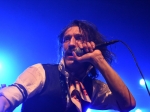
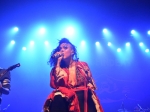
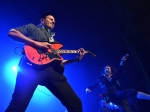
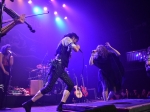
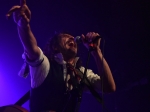
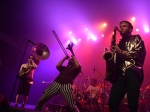
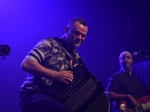
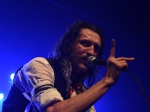
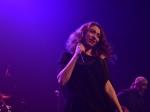
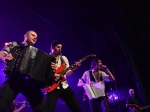
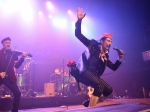
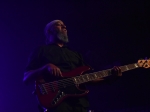




Leave a Reply